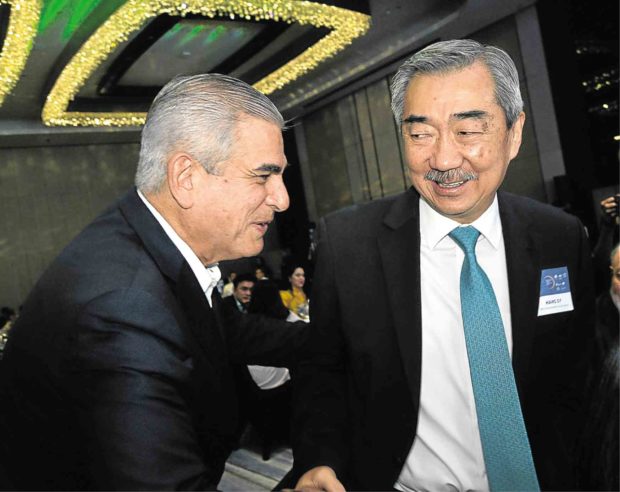PH tycoons embrace sustainability in corporate operations

Ayala Corp. chair and chief executive Jaime Augusto Zobel de Ayala (left) and Hans Sy of SM Investments Corp. —ROMY HOMILLADA
As the global community increasingly grapples with climate change, unprecedented natural disasters and social tension, Philippine tycoons embrace sustainability as an integral way of doing business and future-proofing their own conglomerates for the benefit of society at large.
At the United Nations Global Compact-Global Reporting Initiative regional sustainability summit held at the Conrad Manila this week, Ayala Corp. chair and chief executive Jaime Augusto Zobel de Ayala and SM Investments Corp. adviser Hans Sy represented corporate Philippines in championing the United Nations’ Sustainable Development Goals (SDGs), a universal call to action to end poverty, protect the planet and ensure that all people enjoy peace and prosperity.
“The development of our societies and economies in recent years has shown us that more is demanded from private enterprise as well. We need only look at the pockets of social tension that have risen around the world brought about by inequity, lack of opportunity and the failure of many of our institutions to foster a more equitable and sustainable future. These issues have led to significant introspection across our leadership teams and led us to broaden our products and services with the aim of more formally contributing to greater economic and social inclusivity,” Zobel said.
Sy, who was chief executive officer of property giant SM Prime Holdings for a long time, stressed the importance of big companies thinking about sustainability not just to manage their own risks but to ensure the business continuity of micro, small and medium enterprises (MSMEs) that form their supply chain.
“Empowering supply chains is particularly close to our hearts because SM’s roots were borne from our father’s entrepreneurial spirit,” said Sy, son of the SM group’s late founder Henry Sy and the first Filipino representative to the Private Sector Advisory Group of the United Nations Office for Disaster Risk Reduction.
Article continues after this advertisement“It is because of this that we understand the journey and challenges faced by small and medium enterprises. We want to help them not only by providing a strong market but by building their resilience to overcome their risks and maximize their opportunities,” Sy said.
Article continues after this advertisementSy estimated that about 25,000 MSMEs were part of the ecosystem of the SM group, representing 27 percent of the local SME sector. These are typically mall tenants, traders and suppliers mainly in retail.
For instance, SM Prime has built an SM Reliance Center in SM Clark, Pampanga, to serve as the data storage and capacity building facilities for SME partners. The center also serves as the information and communications for SM. SM Prime has also provided free storage data to serve as the repository for documents essential to early recovery and business continuity. To date, there are over 1,500 SMEs that have availed themselves of this service.
The SM group has also integrated three platforms in terms of its operations and sustainability to include investing 10 percent of its capital expenditure on disaster resilient features depending on a mall’s existing hazards; capacity building and collaboration and public-private partnerships at the global, regional and national levels.
Zobel, who was named UNSDG Pioneer for Sustainable Business Strategy and Operations” in 2017, said the Ayala group was always actively looking to identity opportunities for disruption in sectors that were undergoing “pain points” or challenges in affordability, quality and accessibility. To date, Ayala has a presence in diverse industries that touch on important human needs like housing, water, telecommunications, financial services, transport, healthcare and education.
In April 2019, the Ayala Sustainability Blueprint was launched, providing a framework that allows each business unit to champion specific SDGs and make significant impact in sectors that would benefit the most.
“It gave us a chance to align our new strategies with a broader global framework and set of objectives. To institutionalize this, we designed a long-term sustainability blueprint that lays out actionable and measurable targets that address critical environmental, social and governance gaps we face in our country today. We identified 1) marginalization, 2) large untapped potential of our human capital and 3) irresponsible growth leading to long-term environmental damage as the three critical challenges our group will focus on,” he said.